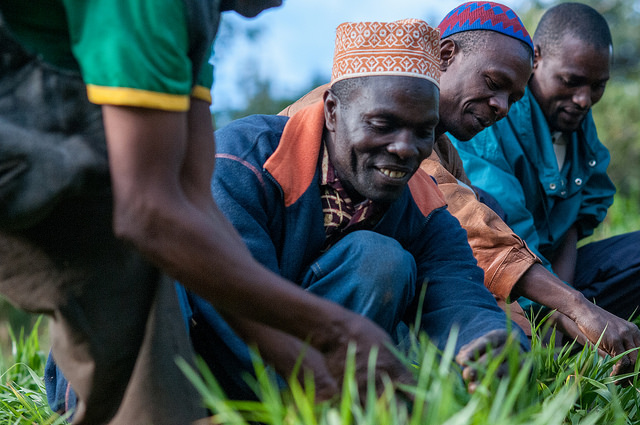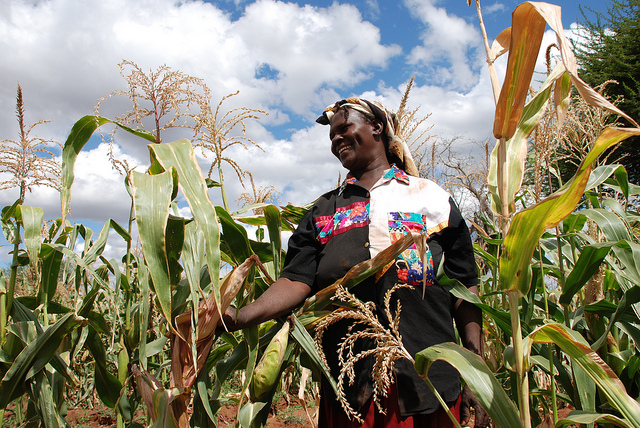
The facts are startling. More than 2 billion people worldwide suffer from micronutrient deficiency – 795 million of whom are undernourished. The challenge to nutritiously and securely feed the growing population is further exacerbated by climate change which has led to extreme weather patterns and decreasing crop yields. With more than 10% of the world’s population living on less than $1.90 per day, the imperative to transform food systems in a way that simultaneously improves lives, livelihoods and the condition of natural resources is clear.
Climate change presents a formidable challenge as one of the biggest constraints to improving food systems, food security and poverty alleviation around the world, especially for the world’s most vulnerable people. The impacts of climate change and poverty are closely interconnected as climate change impacts land availability, rainfall, and disease. With poor people disproportionately dependent on rainfed agriculture for their livelihoods, these communities are thus especially vulnerable to the impacts of climate change. The increasing frequency and intensity of climatic shocks impinges on their ability to sell an agricultural surplus, meaning less reinvestment in their farms and other livelihood activities, and less ability to purchase a nourishing diet.
The breakthrough Paris Climate Agreement of 2015, while far from perfect, represented an historic and ambitious new phase for climate action, and opened a door for the agricultural sector to take a leading role. “We recognize that the agricultural sector has a key role to play in increasing resilience to climate shocks. Food security, food production, human rights, gender, ecosystems and biodiversity were all explicitly recognized in the Paris agreement and these are issues at the core of our work,” according to Elwyn Grainger-Jones, Executive Director of the CGIAR System Organization.
Across Africa, Asia and Latin America, CGIAR and its partners are developing climate-smart technologies to help farmers adapt to climate change as well as mitigate agriculture’s contribution to climate change. The CGIAR Research Program on Climate Change, Agriculture and Food Security (CCAFS) brings together the expertise in agricultural, environmental and social sciences to identify and address this nexus between agriculture and climate change. Innovations such as drought tolerant crops, agricultural insurance schemes and management practices for reducing greenhouse gas emissions are just a few of the technologies being developed by CGIAR.
In Africa, researchers from the International Maize and Wheat Improvement Center (CIMMYT) are working on drought tolerant maize which offers African farmers significant benefits, producing up to 30 percent more grain than conventional varieties under drought. Through beneficial partnerships with governments, private sector and local NGO’s, researchers have fast-tracked varietal releases and fostered competitive seed markets, allowing for widespread access to quality seed at an affordable price.
“A large percentage of resource-poor farmers and consumers live in tropical environments, which are most vulnerable to climate change. By providing research-based knowledge and tools, CGIAR helps farmers adapt, bringing food security and prosperity to these areas,” said Martin Kropff, CIMMYT’s director general and CGIAR System Organization Board Chair. “CGIAR-led research on drought tolerant maize has helped more than 5 million households in 13 countries become more resilient to climate change.”

In Vietnam, Bangladesh and the Philippines, researchers from the International Rice Research Institute (IRRI) are developing rice management techniques, known as alternate wetting and drying, in irrigated lowland areas which could save water and reduce greenhouse gas emissions while maintaining yields.
To ensure that agricultural innovation is developed where needed, CGIAR is prioritizing responsive, farmer driven technologies, particularly in relation to climate-smart solutions.
In Senegal, CGIAR-led research on digital advisory and climate information services are reaching farmers with improved seasonal forecasts via radio and SMS – information that is helping farmers adapt to climate change and improve resilience to climate shocks.
In India, researchers from CCAFS are establishing well-designed agricultural insurance schemes which will enhance resilience to climatic shocks and help protect farmers during bad harvests. CCAFS is also working in partnership with the World Business Council for Sustainable Development (WBCSD) to help major agribusiness companies improve their ability to trace, measure and monitor climate-smart agriculture progress, among others, by developing science-based indicators.
“The challenge we now have is how to take these innovations to scale, reaching millions rather than thousands of farmers. This requires a transformation in the way we partner and deliver our science, as well as targeting and bundling together climate-smart agriculture innovations,” outlined Kropff.
“We recognize that responding effectively to the challenges of climate change hinges on dramatic changes in the way we work,” continued Grainger-Jones. “We have a responsibility to foster paradigm shifts which can prepare us for the challenges we face.
Research led by the International Center for Tropical Agriculture (CIAT) is doing just that, testing the impact of feeding animals with climate-smart Brachiaria grass, of which some varieties can tolerate drought and waterlogging, while others have produced more and better forage.
At its core, CGIAR is committed to transforming agriculture and food systems that will enable the most vulnerable to better nourish their families and improve productivity and resilience.
“As the world’s largest agricultural research for development partnership, CGIAR is in a unique position to respond to the world’s most complex development challenges. We are committed to leading world class climate change science to increase resilience to sustain the planet’s fragile ecosystem,” reflected Grainger-Jones.
Elwyn Grainger-Jones, CGIAR System Organization Executive Director and Martin Kropff, Director General of CIMMYT and Board Chair of CGIAR System Organization recently participated in the: ‘Climate change research and partnerships for impact on food and nutritional security’ event during the opening of the new CGIAR Research Program on Climate Change and Food Security (CCAFS) office at Wageningen University in the Netherlands.
 Climate adaptation and mitigation
Climate adaptation and mitigation